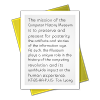Title
Abramson, Norm interviewCatalog Number
102746645Type
DocumentDescription
Contributed by James Pelkey:After receiving his Ph.D. in Electrical Engineering from Stanford University (1958), Norm Abramson remained on the faculty of Stanford (1955-1965), before accepting a visiting professorship at the University of California, Berkeley (1966). He then took as he says, “a pretty big gamble,” and accepted a professorship at the University of Hawaii (1968- ).That big gamble quickly paid off, for in the next year the Department of Defense announced the Themis program to aggressively fund research at “second tier” universities, universities like the University of Hawaii. Abramson, who very much wanted to do research, teamed up with two of his new faculty members, Wes Peterson and Ned Weldon, and others, and conceived a research program that was funded by ARPA and managed by Bob Taylor and Larry Roberts at the IPTO. To become known as ALOHAnet, it proved that broadcast radio communications could be the basis of an inter-island communication system. As important as this finding was, how ALOHAnet influenced Bob Metcalfe’s thinking and led to Ethernet is the story investigated in this interview and the interviews with Metcalfe, Charlie Bass and John Davidson: for Ethernet is one of the important and crowning achievements in the early history of computer communications.
Paul Baran helped me in ways beyond identifying people I should interview. For example, at the time, Paul and Bill Houser were meeting with Norm Abramson to see if there was a way they could help him start a company around technologies dating back to ALOHAnet. On this occasion, Norm was visiting them at Interfax, one of the start-ups Paul and Bill were engaged in launching. Knowing I wanted to interview Norm, they invited me to meet with him at Interfax. I gladly accepted. I am sure that Norm, on seeing how my friends welcomed me, create a level of trust that facilitated our conversation. This is a wonderful story of how it is not necessary to know the objectives or benefits of research if there is sufficient funding, highly qualified and motivated researchers, a supportive network of collaborators and a management style that recognizes managing technical research is vastly different than managing a profit and loss operation. So please enjoy; even the story of the blackboard.
Date
1988-10-13Contributor
| Abramson, Norm, Interviewee |
| Pelkey, James L., Interviewer |
Publisher
Computer History MuseumPlace of Publication
Menlo Park, CaliforniaExtent
13 p.Category
TranscriptionCollection Title
James L. Pelkey collection : history of computer communicationsCredit
Gift of James PelkeyLot Number
X5671.2010Related Records
| 102746648 | James L. Pelkey collection : history of computer communications |


